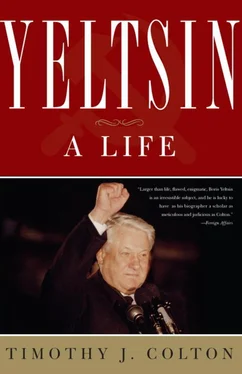Whatever the pretext, what came next was a long journey in convoy to the verge of nowhere: the uninviting and unfarmable environs of Nadezhdinsk, an ironworking center in the far north of Sverdlovsk province (1939 population 65,000), on the Kakva River 400 miles below the Arctic Circle. The Yeltsins and the ten or twelve other households removed with them could each bring only several sacks of belongings; tools and most of their cash and clothing, peasants’ sheepskin coats (tulupy) included, were taken away. 40In the special settlements, exiles worked under police oversight and had 15 percent of their wages garnisheed to maintain the guard force. The outstations used people up: “The [housing]… was unfit for habitation. The lack of food and medical care consigned people to malnourishment and wasting away. Unsanitary conditions spread infections and epidemics of typhus, scarlet fever, and scurvy. All of this led to high mortality rates among the settlers.” 41In the worst years, 1932 and 1933, peasants in some remote northern places had to eat fallen draft animals, moss, and birch leaves. 42
Nadezhdinsk, which in a cruel jest means City of Hope in Russian (it was assigned the name Serov in 1939), held out not an iota of hope to the Yeltsins. 43The outcasts subsisted in a dugout (zemlyanka), a concavity scooped out in the earth, with a wood coal fire for heat and a twig blind against the elements. The only organized industries in the virgin land around Nadezhdinsk were forestry and mining, which Ignatii was too old and arthritic to do. By grace of the police, he was given a few trips back to Butka to fix farm machinery for the kolkhoz. That was his only comfort. Destitute and distraught, he lost his sight and went into mental collapse. Ignatii Yekimovich died a broken man in 1936, at the age of sixty-one, far short of ninety. His widow was let out of the area in 1936 and moved to Berezniki to live with her eldest son, Ivan, and died there before her time in 1941. 44
The story did not end with the deaths of Ignatii and Anna. The gruesome truth is that all four of Yeltsin’s grandparents were victims in their own way of the terror. Vasilii Starygin had hired workmen in his homebuilding business, which was enough for him, too, to be dekulakized and deposited in Butka in 1930. In 1934, the same year the Yeltsins were transported north, the OGPU (the appellation of the Soviet political police in the first half of the 1930s) marooned Vasilii and Afanasiya Starygin in the selfsame subarctic precinct. At Nadezhdinsk/Serov they eked out a threadbare existence for eleven years. They apparently had some contact with the elder Yeltsins in the two years Ignatii and Anna spent in the area. A little younger and in better health, the Starygins were more adaptable than their relations by marriage. Vasilii built himself and his wife an above-ground cabin. He kept his sanity and kept afloat economically by making furniture and cabinets and selling them locally. 45Boris Yeltsin and his mother, he was to say in an interview, paid calls on the grandparents in the summertime and helped out with the gardening. 46
The riddle of how the grandfather could die in the 1930s and miraculously reappear in the 1940s is thus solved: The first grandfather in Yeltsin’s transcription is his father’s father, Ignatii Yeltsin; the second is his mother’s father, Vasilii Starygin. Starygin was the master carpenter, not the blacksmith and mill owner, which would explain why his opinion would have been so treasured by Boris Yeltsin as he pondered going into construction and why Starygin would have wanted his grandson to prove himself with the steambath project. Dekulakized peasants and many administrative deportees in the Soviet Union were allowed out of their places of servitude after the war, especially if a close relative had fought in it; the rest were to be freed after Stalin breathed his last in 1953. 47Possibly since several family members had been in the army, the Starygins, both of them still spry, were discharged in 1945. Nikolai and Klavdiya Yeltsin fetched her parents in Serov and brought them to Berezniki to share quarters with them and their children. They were to live to the ripe old age of ninety-one (for Vasilii Yegorovich, who would die in 1968) and eighty-nine (for Afanasiya Kirillovna, who died in 1970). From the same peasant stock and locale as Ignatii and Anna Yeltsin, they outlasted them by three decades. 48
Another bolt of lightning hit Boris Yeltsin’s parents. Nikolai, while admitted to the Butka kolkhoz, was looking even before his son’s birth for something better. This search led him to Nadezhdinsk, of all places, the little town near which his parents were to land in 1934. There he joined the great wave of peasants in quest of work in the new factories burgeoning in the Soviet Union’s first five-year plan. His 1950s autobiography tells us he “worked from 1930 to 1932 as a foreman” in Nadezhdinsk, presumably in the construction of a factory there. 49His presence in Nadezhdinsk could not have been continuous. He was in Basmanovo to father Boris Nikolayevich in May or June of 1930, he was in Butka for the baptism in February or March of 1931, and he was attached to the Butka kolkhoz after Boris’s birth. 50Spotty evidence suggests that Nikolai, Klavdiya, and their newborn spent the winter of 1931–32 in Nadezhdinsk and returned to the village after that. 51In December 1932 the kolkhoz chairman let Nikolai and his kid brother, Andrian, go somewhere else. The train they boarded was not to Nadezhdinsk or to Berezniki, as Yeltsin’s first book of memoirs says, but to Kazan, the polyglot capital of the republic of Tatariya, on the Volga River equidistant from Sverdlovsk and Moscow.
Ivan the Terrible conquered the Volga Tatar khanate at Kazan in 1552, annexed its territories, and opened it to Russian settlers and to Orthodoxy (the Tatars are Sunni Muslims). Lenin lived there for a few months in 1887 and was expelled from the local university for revolutionary activity. The population was a quarter million in 1932. The Yeltsin men signed on as woodworkers in Aviastroi, the syndicate constructing Works No. 124, an aviation plant, at the hamlet of Karavayevo, five miles north of the Kazan kremlin. The works was going to produce gleaming military aircraft designed by the illustrious aeronautical engineer Andrei Tupolev. 52Those who put it up were limited to pick and shovel, flatbed trucks, and hand tools. Nikolai was promoted to leader of a crew that built housing, an equipment depot, and a workshop in the assembly hangar. He also, it would seem, studied in the evenings in a technical school (tekhnikum) for construction personnel. 53Klavdiya and her toddler lived with him in Barracks No. 8 in the settlement of Sukhaya River. A Russian “barracks” (barak) is a ramshackle wood shack, either unpartitioned or ranging bedrooms off of a long corridor; the Sukhaya River building had the latter plan. Nikolai and his wife and son had an unadorned family room to themselves; Andrian’s bachelor room was one door down. “Like nomads,” Klavdiya and Boris again flitted to Butka in the spring and back to Kazan when the snow flew. They kept up their shuttling between village and city, which was commonplace in nineteenth- and early twentieth-century Russia, for several years. 54
On April 27, 1934—not in 1937—the young family’s world was turned topsy-turvy. OGPU officers, let in by the barracks commandant, collared Nikolai and Andrian Yeltsin and took them off in a “black crow” paddy wagon to the Kazan political prison. The arrest report said all their rooms contained were sticks of furniture and a smattering of letters and identification papers. 55Six Aviastroi workers from Urals and Volga farm families had been under observation since January 1934. In conspiratorial mode, the OGPU gave them the code name Odnosel’chane, Countrymen, implying that they were from the same village or district. But they were not. Besides the two Yeltsins, there were Prokofii Gavrilov and his son Ivan, ethnic Russians from another part of the Urals, plus Vasilii Vakhrushev, whose nationality was Udmurt, a Finno-Ugric minority, and who was from Udmurtiya, and Ivan Sokolov, a Russian from Tatariya. The file bulged with materials from their home villages and the Kazan workforce. Three weeks of bullyragging led to accusations of “anti-Soviet agitation and propaganda,” a crime under the infamous Article 58, Section 10 of the Russian penal code. On May 23 an OGPU tribunal, ruling on Case No. 5644, found them guilty as charged and sentenced five of the six (the Yeltsins, the Gavrilovs, and Vakhrushev) to three years in a forced-labor camp, minus one month for time served; Sokolov, fingered as the inciter, got five years. If they had come into the police’s clutches in 1930 or 1931 or after 1935, they would have been much more liable to be tortured or put to death. 56
Читать дальше












